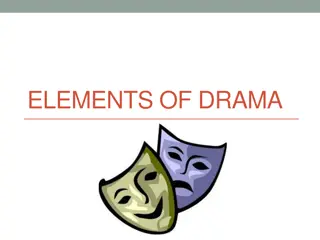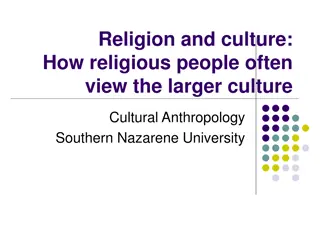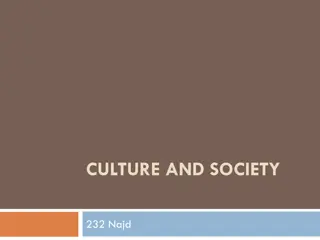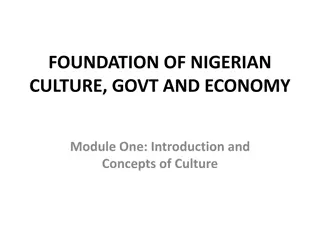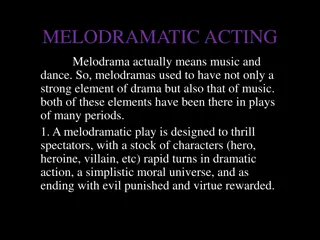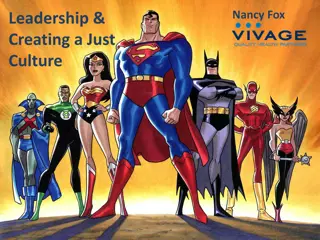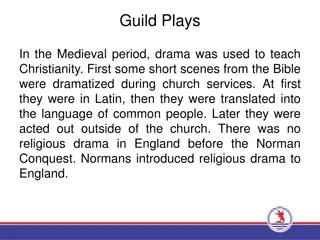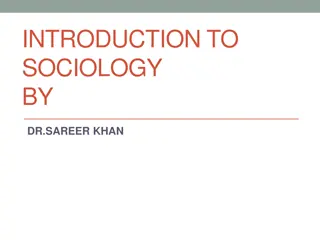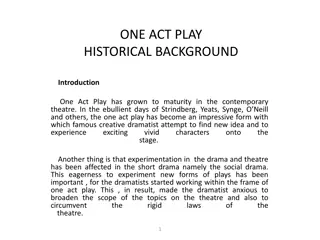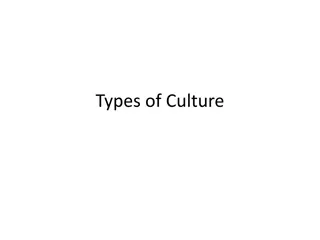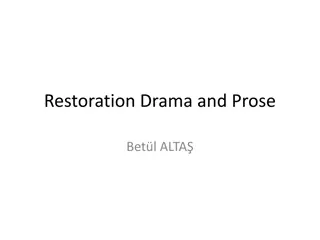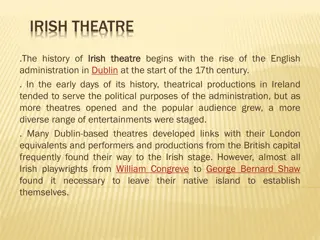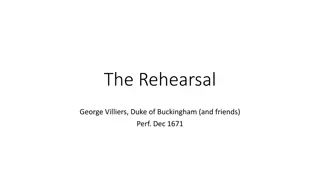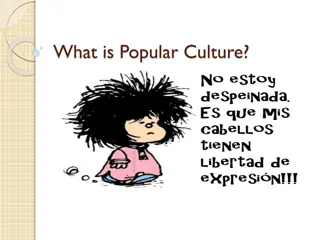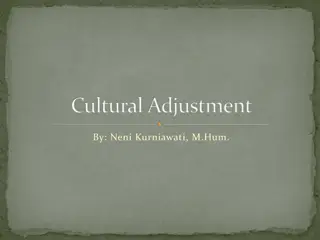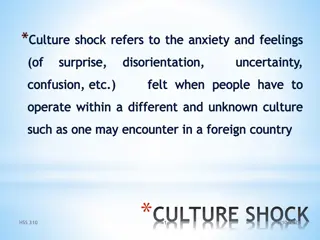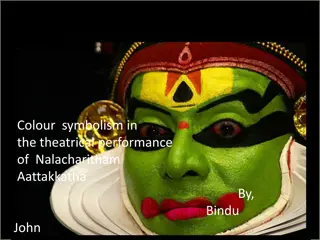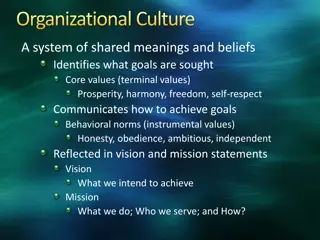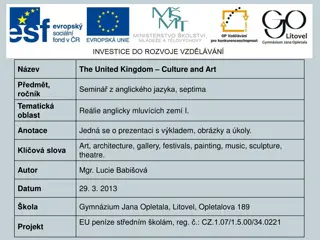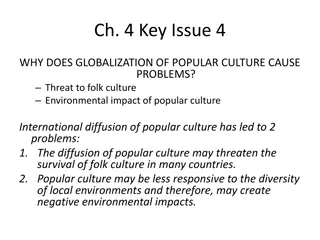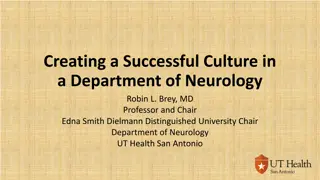Understanding the Elements of Drama and Theater History
Drama, originating from the Greek verb "dran," involves acting and storytelling in front of an audience. Explore the key aspects, from the Globe Theater in London to dramatic structure, actors, and speech forms like dialogue and monologue. Learn about the crucial components such as playwrights, acto
4 views • 22 slides
Exploring Performance and Storytelling in 'Hag-Seed' Prologue
In the prologue of "Hag-Seed" by Margaret Atwood, the performative nature of storytelling is vividly portrayed through the setting of a theatrical performance within the novel. Atwood intertwines themes of reimagining existing stories, life as a performance, and the connection to Shakespeare's works
1 views • 6 slides
Perspectives on the Relationship Between Religion and Culture
Religious people often perceive the larger culture in different ways, as illustrated by Richard Niebuhr's classic positions in "Christ and Culture" and Charles Kraft's later perspectives on God's role in culture. These viewpoints range from rejecting cultural influence to integrating Christianity an
1 views • 14 slides
If you are looking for Venue Selection in The Lakes
If you are looking for Venue Selection in The Lakes, Dusk Till Dawn Entertainment is leading turnkey event solutions provider in Las Vegas. With almost two decades of experience in the industry, we have taken care of all the groundwork, so you don't have to. From corporate gatherings to private affa
0 views • 6 slides
Understanding Culture and Society
Culture and society are interconnected concepts, where culture encompasses beliefs, behaviors, and objects shared within a community, shaping their identity and values. Society, on the other hand, comprises individuals interacting based on common cultural bonds, whether ethnic, gender-based, or thro
0 views • 12 slides
Understanding Nigerian Culture, Government, and Economy: Module One
Delve into Module One of the course on Nigerian culture, government, and economy with a focus on the Introduction and Concepts of Culture. Explore definitions of culture, various types of culture, characteristics, importance, related concepts, levels, and differences between culture and ethnic group
1 views • 31 slides
Understanding Melodramatic Acting in Theatre
Melodramatic acting in theatre combines elements of drama, music, and spectacle to create thrilling performances for audiences. These plays feature stock characters, rapid dramatic action, and a simplistic moral universe where good triumphs over evil. Actors in melodramas must master melodramatic sp
0 views • 7 slides
Understanding Just Culture in Leadership: Creating a Fair and Error-Preventive Environment
Punitive culture in institutions can lead to mistakes being hidden, affecting error prevention. Dr. Lucian Leape highlights the importance of avoiding punishment for errors, advocating for a Just Culture model. This model, coined by David Marx, recognizes human error and helps differentiate between
0 views • 24 slides
Medieval Drama: Guild Plays and Moral Lessons
Learn about the evolution of medieval drama in England, from religious guild plays to morality plays and interludes. Guild plays, including mystery and miracle plays, were performed by craft guilds to teach Christianity through biblical stories. Morality plays like "Everyman" aimed to impart moral l
3 views • 9 slides
Symbols and Facts: Uncovering Shakespeare and Elizabethan Theatre
The analysis begins by exploring the symbols present on the cover of "Romeo and Juliet" such as the sword and roses. It then delves into distinguishing facts from opinions regarding Shakespeare's life, touching on key events like his baptism, marriage, and career. Additionally, it provides insights
0 views • 26 slides
Understanding Plant Tissue Culture: Methods and Requirements
Plant tissue culture involves the in-vitro culture of plant explants under aseptic conditions, covering cell, organ, and suspension cultures. This process, pioneered by German botanist Gottlieb Haberlandt, relies on the totipotency of plant cells. Key requirements include laboratory organization, su
0 views • 18 slides
Ancient Indian Theatrical Art Forms and the Theory of Rasa in Natya Shastra
The Natya Shastra, attributed to Bharata Muni, is an ancient treatise influencing Indian dance, music, and literary traditions. This comprehensive work covers various aspects of theatre, including acting, dance, music, and more. The concept of Rasa, denoting the aesthetic essence that evokes emotion
0 views • 18 slides
Leading to Safety
Examining the crucial link between organizational culture and safety programs, this content emphasizes the importance of fostering a culture of safety within organizations to ensure the success of safety initiatives. It explores the process of changing organizational culture, starting from defining
0 views • 20 slides
Understanding Culture in Sociology: Key Concepts and Definitions
Culture is the cornerstone of society, distinguishing humans from animals and shaping our social lives. Sociologists define culture as the shared values, practices, norms, and beliefs that govern our interactions and behaviors. This comprehensive guide explores the non-material aspects of culture, i
1 views • 30 slides
Evolution of One-Act Plays in Contemporary Theatre
One-Act Plays have evolved significantly in contemporary theatre, with famous dramatists like Strindberg, Yeats, and Synge experimenting with this concise form. Initially farcical, one-act plays became more focused, dealing with single dominant situations and themes like human life's complexities. T
0 views • 5 slides
Understanding Plant Tissue Culture Media and Their Importance in In Vitro Growth
Plant tissue culture media play a crucial role in the in vitro growth and morphogenesis of plant tissues. The composition of culture media depends on the specific plant species and the type of material used for culture. Various types of media, such as White's medium, MS medium, B5 medium, N6 medium,
0 views • 6 slides
Overview of Cell Culture Methods and Importance in Research
Introduction to the principles of cell culture, including tissue culture, organ culture, and cell culture methods. Discusses the advantages and disadvantages of each technique and highlights the need for cell culture in research for studying cellular behavior and large-scale production of cell mater
3 views • 45 slides
Devising Drama - GCSE Knowledge Organiser
This GCSE Drama Knowledge Organiser provides guidance on devising and performing an original piece of theatre based on a stimulus. It covers how to respond to stimuli, develop ideas for theatrical performances, apply theatrical skills, analyze and evaluate work, and rehearse and refine the devised p
0 views • 10 slides
Understanding Popular Culture: Classification and Impact
General classification of culture includes Popular, High/Elite, Low/Subculture, Primary & Secondary, Folk, and Co-Culture. Popular culture, shaped by mass media, encompasses ideas, attitudes, and phenomena favored by society. It influences daily life, with examples like styles of dress, slang, and s
0 views • 16 slides
Exploring the Rasa Theory in Natya Shastra: An Ancient Guide to Indian Theatrical Arts
The Natya Shastra, attributed to Bharata Muni, is a comprehensive treatise on the arts that has shaped Indian dance, music, and literary traditions. This ancient text delves into various aspects of theatre, such as acting, dance, music, and construction, providing a foundation for Indian theatrical
3 views • 18 slides
Exploring Restoration Drama and Prose in the Era of Charles II
In 1660, with Charles II's ascent to the throne, Restoration literature saw a revival alongside the political landscape. Playwrights like John Dryden and Thomas Otway contributed significant works, with genres ranging from heroic plays to satirical comedies. The era also witnessed the emergence of t
1 views • 12 slides
History and Evolution of Irish Theatre
Irish theatre has a rich history intertwined with politics and cultural developments. From serving political purposes in the 17th century to nurturing indigenous writers and performers in the 20th century, Irish theatre has seen significant evolution. Dublin has been a key hub for theatrical product
0 views • 24 slides
The Rehearsal and The Antagonists: Satire in Restoration Drama
The Duke of Buckingham's satirical play "The Rehearsal" marked a significant shift in Restoration drama by mocking contemporary heroic plays and literary figures like John Dryden. The play, first performed in 1671, achieved popularity and influenced a tradition of dramatic burlesque on the English s
1 views • 8 slides
Perspectives on Youth Culture Through Functionalist and Neo-Marxist Views
Functionalist and Neo-Marxist perspectives on youth culture offer contrasting views on its purpose in society. Functionalist theorists emphasize the role of youth culture in providing a transitional phase for young people, aiding in their social integration and development of independence. On the ot
0 views • 11 slides
Understanding Popular Culture and Ideology
Popular culture encompasses the lived practices and artistic products of society, contrasting with high culture. Various definitions highlight its appeal to a wide audience and its distinction from high culture. The relationship between popular culture and ideology is explored through practices that
0 views • 15 slides
Evaluating the Production Elements: Set Design, Props, Costume, Lighting, Sound, Special Effects, Acting & Directing
Use the guide slides to assess various production elements including set design, props, costume, lighting, sound, special effects, acting, and directing. Explore examples from scenes like Peter Pan teaching children to fly, impactful moments, successful elements, and set design descriptions. Gain in
1 views • 7 slides
Exploring Plastic Theatre in Tennessee Williams' "A Streetcar Named Desire
Tennessee Williams introduced the concept of plastic theatre in the 1940s to create a new type of theatrical experience that combined non-literary elements with the literary text. This approach aimed to enhance the themes, characters, and language of the play by integrating elements such as setting,
0 views • 9 slides
Understanding Cultural Adjustment: Navigating Different Ways of Life
Cultural adjustment involves experiencing culture shock when encountering a new way of life due to immigration, travel, or a shift in social environments. This process includes symptoms like excessive concern, fear of physical contact, and refusal to learn the host country's language. Overcoming cul
0 views • 12 slides
Understanding Culture Shock: Phases, Symptoms, and Coping Strategies
Culture shock is the anxiety and disorientation experienced when adapting to a new and unfamiliar culture. This phenomenon involves various stages, from the honeymoon phase to readjustment and reverse culture shock. Symptoms of culture shock can be physiologically, psychologically, and socially base
1 views • 11 slides
Exploring Colour Symbolism in the Theatrical Performance of Nalacharitham Aattakkatha John Bindu
Delve into the captivating world of colour symbolism in the theatrical performance of Nalacharitham Aattakkatha John Bindu, where hues convey deeper meanings and emotions. Discover how colours like Pacha, Minukku, Karuthathadi, and more play a vital role in portraying characters and themes, enhancin
0 views • 13 slides
Proposed NRC Safety Culture Policy Statement Overview
This document provides an overview of the proposed Nuclear Regulatory Commission (NRC) Safety Culture Policy Statement presented by Eric Fries, the Safety Culture Program Manager. It covers topics such as NRC's mission, responsibility, safety culture background, draft policy statement, current statu
0 views • 24 slides
Plant Tissue Culture Methods for Growth and Reproduction Study
Plant tissue culture methods such as root tip culture, shoot-tip culture, leaf culture, flower culture, and anther and pollen culture allow for the study of growth, reproduction, and genetic variations in plants. These techniques involve culturing various plant parts under sterile conditions to inve
1 views • 20 slides
Understanding Rasa Theory in Indian Theatrical Arts
Explore the significance of Rasa theory in Indian theatrical arts as outlined in the Natya Shastra, an ancient treatise on performing arts. Discover how bhavas create rasas, evoking emotions in the audience and transporting them to a parallel world of wonder and reflection. Learn about the historica
0 views • 18 slides
Understanding Organizational Culture and Its Impact on Business Success
Organizational culture encompasses shared beliefs, values, and behaviors within a company. It influences goal-setting, strategies, and employee actions. The transmission of culture is vital for aligning values with business practices. Culture matters for client relations, differentiation, and managi
0 views • 17 slides
Understanding Corporate Culture vs. Safety Culture in Organizations
Explore the dynamics of corporate culture and safety culture within organizations through a series of images and quotes. Learn about aligning goals, promoting a culture of safety, and the crucial factors that contribute to a safe workplace environment. Delve into the responsibilities of management,
0 views • 38 slides
Exploring Culture and Art in the United Kingdom
Delve into the rich cultural heritage of the United Kingdom through its vibrant arts scene, including festivals like the Edinburgh Festival, Glyndebourne Opera, and Glastonbury Festival. London's West End theaters offer a plethora of theatrical experiences while art enthusiasts can explore the Natio
0 views • 10 slides
Certificate Courses in Indian Cultural Studies by Department of Vedic Sciences & Indian Culture
Explore month-long certificate courses in Indian Cultural Studies offered by the Department of Vedic Sciences & Indian Culture in collaboration with Sri Aurobindo Foundation for Indian Culture. Delve into India's rich cultural heritage to gain insights into ancient wisdom traditions, prepare for con
0 views • 8 slides
Challenges of Globalization in Popular Culture
Globalization of popular culture presents challenges such as the threat to folk culture and negative environmental impacts. Rising incomes lead to a shift from folk to popular culture, affecting traditional values and clothing symbolism. The adoption of Western clothing in Middle Eastern countries f
0 views • 12 slides
Cultivating a Successful Culture in Neurology Department
Importance of culture in a neurology department highlighted by Dr. Robin L. Brey. Emphasis on how culture trumps strategy and the role of leaders in maintaining a positive culture. Examples and insights on how culture influences decision-making and behavior. Attributes of a successful culture and ho
0 views • 21 slides
Uncovering Theatrical Depths in Hamlet's Characterization
Unveiling the theatrical intricacies within Hamlet's character, this piece delves into the subtext of his actions and the underlying motives behind his feigned madness and calculated interactions, as depicted in A. Kernan's work "The Playwright as Magician". Through a close analysis of pivotal scene
0 views • 31 slides
